|
"President Clinton and his national security team ignored several opportunities to capture Osama bin Laden and his terrorist associates, including one as late as last year" -Mansoor Ijaz, L.A. Times, December 5, 2001
Audio: Smoking Gun
Time Magazine recently printed a story about Clinton handing the incoming Bush Administration a plan, but quickly that myth was dispersed. Bush Administration officials denied ever getting any plan only leaving us to conclude that Time Magazine was being spoon fed by Clinton toadies. They turned a quick power point presentation with one section whereby Clarke made a few suggestion into some elaborate plan and blueprint for going after Al Qaeda. It was a 3 to 5 year roll back.
Clinton did help the incoming Bush Administration by denying them transition funds and forcing them to set up an office in Virginia and run off of donations. Addtionally he looted and then vandalized the White House. Bush has a plan crafted to eliminate Al Qaeda and did approve it only days before 9-11 and it unfortunately was too late.
Above is the Smoking Gun. An audio of Bill Clinton admitting clearly that he rejected his own Administration's preparation for an attack in 1999 or 2000. He offers the typical Clintonesque excuses saying it simply wouldn't work.
Audio: Clinton Tales
AIM Report #18 - Clinton Tales of Getting Bin Laden
In recent commentaries we talked about how the Clinton administration had actually helped support Osama bin Ladens al-Qaeda terrorist organization. This was done partly through support of the Kosovo Liberation Army, the KLA, in its war against Serbia. The core of the KLA were radical Muslim Marxists who trafficked in heroin, and were linked to bin Laden. It was also done, arguably, as a geopolitical consideration, believing that the Taliban government of Afghanistan served American interests as a check on Iran.
Clintons actions as president have come under close scrutiny as journalists and politicians have begun to analyze how the U.S. was so vulnerable to the September eleventh attacks on the World Trade Center and the Pentagon. Recent articles by the Associated Press and the Philadelphia Inquirer have charged that the Clinton administration had opportunities to eliminate bin Laden, but failed to do so. The Inquirer article reported that the U.S. had for years both "the knowledge and capability to kill...bin Laden." It said that American special forces and CIA operatives had been in Afghanistan, but were prohibited by the White House from going after him.
Bin Ladens terrorist organization had been linked to the 1993 World Trade Center bombing, and to the 1998 bombings of the U.S. embassies in Kenya and Tanzania, for which he was indicted by the U.S. government. Clinton signed a policy directive authorizing the CIA to prepare a plan to get him. We attacked one of his camps in Afghanistan with cruise missiles and reportedly killing some of his supporters. Our missiles also destroyed an aspirin plant in Sudan owned by a Saudi businessman. It was targeted because it was believed to be a chemical-weapons plant owned by bin Laden.
The AP has reported that last December the Pentagon told President Clinton that they knew the location of bin Laden and could take him out. But Clinton decided it was too risky, and refused to authorize such an action. Clinton was asked by Fox News if this was true. He said it was not true and that his best shot was when he bombed bin Ladens training camp in 98. Several days later he told the London Times he had authorized bin Ladens capture or assassination two years ago, but the intelligence information needed to carry it out was never available.
Representative Dana Rohrabacher, a Republican from California, charged in a speech on the House floor on September 17, that the Clinton administration had secretly informed Pakistan and Saudi Arabia that it would not try to overthrow the Taliban. He had tried in vain to persuade the Clinton administration that this was a mistake and that the U.S. should be supporting the Northern Alliance, which has succeeded in keeping the Taliban from taking over all of Afghanistan.
Rohrabacher, an authority on Afghanistan, also said that he was going to see White House officials on September 11 to warn them that the Talibans assassination of Commander Massoud, the leader of the Northern Alliance, meant that bin Laden was going to do something so terrible that retaliation would be required. He was right, but his warning was too late.
Click above on the audio link to listen to all of the commentary.
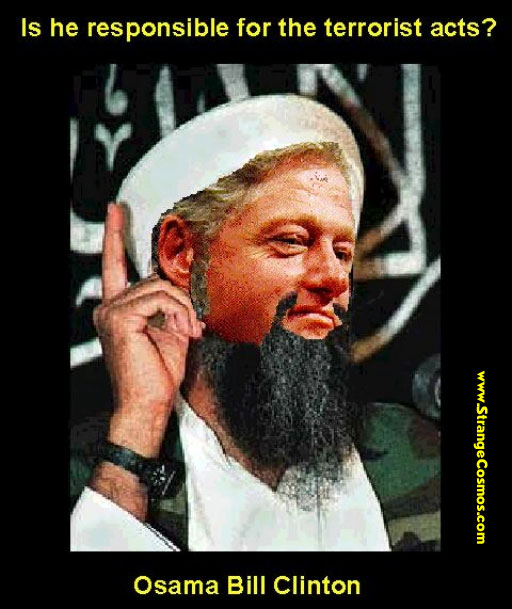
Under Clinton, we suffered 6 major attacks that were orchestrated by Bin Laden.
After the 1993 World Trade Center bombing, which killed six and injured 1,000; President Clinton promised that those responsible would be hunted down and punished.
Bill Clinton warned America in his radio address that we should not overreact to the 1993 WTC bombing. "I would discourage the American people from overreacting to this," Clinton said.
Bill Clinton treated it as a petty criminal offense even though Bush 41 told him terrorists had declared war on America.
CIA director Woolsey now reveals that he never had a private personal meeting with Clinton during the first two years of his tenure as head of the CIA - exactly the key period in investigating the 1993 attack.
Bill Clinton did not visit the WTC towers.
Bill Clinton did not even make a public appearance on national television.
Bill Clinton tried to stop a reward fund for the capture of terrorists involved in the attack.
From the time President Clinton took office until May of 1995, a Presidential Decision Directive, PDD 39, sat in the National Security Council, in the In Box of one of the officials with no action taken. The significance of PDD 39 is that it was the document defining what the missions and roles were of combating terrorism.
Despite what happened at the World Trade Center in 1993, the Clinton administration did not finally act on [PDD 39] until after the attack in Oklahoma City.
The only reason for that is because in the two weeks prior to Oklahoma City, the front page of both Newsweek and Time Magazine carried the question: 'Is President Clinton Relevant?'
After the 1993 ambush in Somalia, which killed 19 and injured 84; President Clinton just tucked tail and ran away.
On May 4, 1993, Clinton having taken office in January, U.S. Marine Lt. Gen. Robert Johnston handed over control of the relief mission to the UN. "It's all yours," he told the new UN commander, a Turkish general, as he departed with most of his U.S. troops in tow.
Bill Clinton sent U.S. Army Rangers on a highly risky mission to take out Aidid. Aidid militia were not Somali but members of bin Laden's Al Qaeda network, who were deployed in his Mogadishu bases.
Bill Clinton denied the Pentagon a request for armor support.
After botching the whole mission, Clinton pulled out and Bin Laden took notice of that.
Bill Clinton even gave the target of the mission, Aidid, a marine guard after the botched mission to capture him.
After the 1995 bombing in Saudi Arabia, which killed five U.S. military personnel; Clinton promised that those responsible would be hunted down and punished.
After the 1996 Khobar Towers bombing in Saudi Arabia, which killed 19 and injured 200 U.S. military personnel; Clinton promised that those responsible would be hunted down and punished.
Bill Clinton cared so little that his own assistant secretary of state, Dick Holbrooke, had trouble getting him to pay attention to warnings about the impending attack on the Khobar Towers.
After the Khobar Towers bombing in Saudi Arabia in 1996, Clinton had Dick Morris take a poll. "We tested 'peacemaker' or 'toughness,'" York quotes Morris as recalling. The public preferred toughness. "So Clinton talked tough." But the FBI director, Louis Freeh, became so exasperated by Clinton's failure to raise the matter with Saudi officials that he actually asked former President George Bush to do so instead.
After the 1998 bombing of U.S. embassies in Africa, which killed 224 and injured 5,000; Clinton promised that those responsible would be hunted down and punished.
Clinton used American tax dollars to pay for the trucks used in the embassy bombings. (See Below)
The U.S. State Department thwarted an investigation into two suspects in the Aug. 7. 1998, bombing of the U.S. embassies in Dar es Salaam, Tanzania and Nairobi, Kenya, which had killed more than 250 people, including 12 Americans, according to reports from MSNBC news filed on July 29.
Clinton was more concerned with obstructing justice than doing anything about such a grave terrorist attack.
After the 2000 bombing of the USS Cole, which killed 17 and injured 39 U.S. sailors; Clinton promised that those responsible would be hunted down and punished.
Shortly after the bombing of the Cole, Clinton had an opportunity to take Bin Laden out and refused to. (See Below)
A Pentagon intelligence expert on terrorism in the Persian Gulf has told Congress that he warned of possible terrorist attacks on U.S. forces.
Maybe if Clinton had kept his promise and got Bin Laden, 3,000 people in New York, Washington, D.C., and the Heros of Flight 93 that are now dead would be alive today and we wouldn't have lost 290 people along with more than 6,323 people that had been injured on his watch.
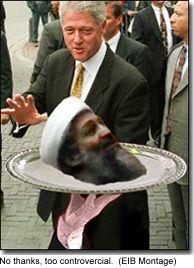
Under Clinton, at least three opportunities to have Bin Laden handed over to the U.S. were rejected inexplicably.
According to the Sunday Times of London, Clinton himself said his refusal to accept the offer to hand over Bin Laden was the "Biggest Mistake" of his presidency.
According to anonymous sources in the CIA, Clinton did not want Bin Laden arrested.
The intelligence officials, both of whom were involved in secret negotiations between Washington and Khartoum to take bin Laden into custody, offered the damning accounts to New York's Village Voice.
A U.S. intelligence official, speaking on condition of anonymity, this week called the Clinton administration's decision to pass up a chance to arrest Osama bin Laden in 1996 a "disgrace," saying "somebody didn't want this to happen."
A second intelligence official, also speaking anonymously, corroborated the charge that there was a deliberate effort to let bin Laden escape from the Sudan to Afghanistan, saying "somebody let this slip up."
The second official lamented that the U.S. lost a treasure trove of intelligence on the elusive al-Qaeda chief when it let him slip away. "It was not a matter of arresting bin Laden but of access to information," he told the Voice.
The first instance they cite was Sudans offer to extradite bin Laden in 1996. The Clinton administration turned them down, saying there wasnt enough evidence to convict him in an American court. Originally this was denied by administration officials, but according to the Times, senior sources from within the administration now confirm it was true. In the January issue of Vanity Fair magazine, former ambassador to Sudan, Timothy Carney, confirmed it, saying it had serious implications regarding the U.S. embassy bombings in 1998, and that "the U.S. lost access to a mine of material on bin Laden and his organization."
The second offer the Times article details involved Mansoor Ijaz, a Pakistani-American who contributed to Clintons presidential campaign and served as a go-between for the administration and various powers in the Middle East. Ijaz presented an exchange of e-mails as evidence to prove that he had in fact met with Clinton officials and intelligence officers from the United Arab Emirates, who were offering to help to deliver bin Laden to the U.S. Ijaz says the deal was blown when Clinton sent his top counterterrorism adviser to meet the Arab leaders directly rather than continue to go through back channels.
The third offer, described as mysterious, was said to come from Saudi Arabian intelligence agencies. It was said to involve putting a tracking device in the luggage of bin Ladens mother during a visit to her son in Afghanistan, but it too was turned down. Richard Shelby, the highest ranking Republican on the Senate Intelligence committee, said he was aware of a Saudi offer to help, but was not able to talk about the specifics.
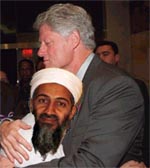
Under Clinton, there were several opportunities to take out Bin Laden, but her refused to authorize them.
Shortly after September 11th, articles by the AP and the Philadelphia Inquirer charged that the Clinton administration had chances to take out bin Laden, but refused to authorize it.
In the waning days of the Clinton presidency, senior officials received specific intelligence about the whereabouts of Osama bin Laden and weighed a military plan to strike the suspected terrorist mastermind's location. The administration ultimately opted against an attack.
The information spurred a high-level debate inside the White House in December 2000 about whether the classified information provided the last best chance for President Clinton to punish bin Laden before he left office, the officials said.
"There were a couple of points, including in December, where there was intelligence indicative of bin Laden's whereabouts. But I can categorically tell you that at no point was it ripe enough to act," former National Security Adviser Sandy Berger told The Associated Press.
In May 1996, the Sudanese capitulated to U.S. pressure and asked Bin Laden to leave, despite their feeling that he could be monitored better in Sudan than elsewhere.
Another golden opportunity to eliminate Bin Laden was after he had been expelled from Sudan. He flew in a plane to Afghanistan and his plane could have easily been taken out.
Former Yugoslav President Slobodan Milosevic told the U.N. tribunal Tuesday that Osama bin Laden was in Albania in 2000 and that the Clinton Administration had discussed it with him.
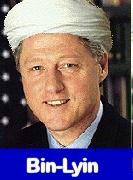 And still, Clinton lies and says his 1998 'Wag the Dog' move firing cruise misiles at an aspirin factory and 14 dollar tents, was the "best chance" we had to get Bin Laden.
On Aug. 20, 1998, three days after half-confessing to lying about Monica Lewinsky and the day she testified before a federal grand jury, former President Clinton declared bin Laden the world's most dangerous terrorist.
Bill Clinton has made a series of public statements claiming his administration came close to killing bin Laden during a cruise-missile raid in 1998.
Touring the rubble of lower Manhattan on September 13, Clinton said, "The best shot we had at him was when I bombed his training camps in 1998. We just missed him by a matter of hours, maybe even less than an hour."
A few days later, on NBC, Clinton said, "We had quite good intelligence that he and his top lieutenants would be in his training camp. So I ordered the cruise-missile attacks, and we didn't tell anybody, including the Pakistanis, whose airspace we had to travel over, until the last minute. And unfortunately we missed them, apparently not by very long....We never had another chance where the intelligence was as reliable to justify military action."
But one of Clinton's top military commanders, who was deeply involved in the Afghanistan operation, has a different recollection. In an interview with National Review Online, retired general Anthony Zinni, commander of U.S. forces in the region at the time, described the 1998 cruise-missile raid as a "million-to-one-shot."
"There was a possibility [bin Laden] could have been there," Zinni recalls. "My intelligence people did not put a lot of faith in that....As I was given this mission to do, I did not see that anyone had any degree of assurance or reliability that that was going to happen."
George W. Bush has made it clear he sees the action as a model of how not to strike back at terrorism. "When I take action, I'm not going to fire a $2 million missile at a $10 empty tent and hit a camel in the butt," Bush reportedly told a group of senators. "It's going to be decisive."
Refer to above for even more damaging facts that Clinton was offered Bin Laden on a platter silver platter at least three times and had several opportunities to take out Bin Laden and refused to do so.
Also, Clinton ordered the military to pump as many as 20 Tomahawk missiles into what he said was a chemical-weapons plant in Sudan financed by bin Laden. It turned out to be a pill plant owned by a Saudi businessman to whom the administration later had to pay $1 million in interest for seizing his plant.
Intelligence officials at the time expressed reservations about including the plant on the target list. Clinton picked the target himself.
"Clinton knew it wouldn't work in Afghanistan. It was a public-affairs move," the Pentagon official said, arguing that bombing is an extremely unreliable way to destroy a terrorist cell or assassinate its leader. "If he hit him [bin Laden], he would have been lucky."
The mission, which used some 80 missiles at a price of about $750,000 apiece.
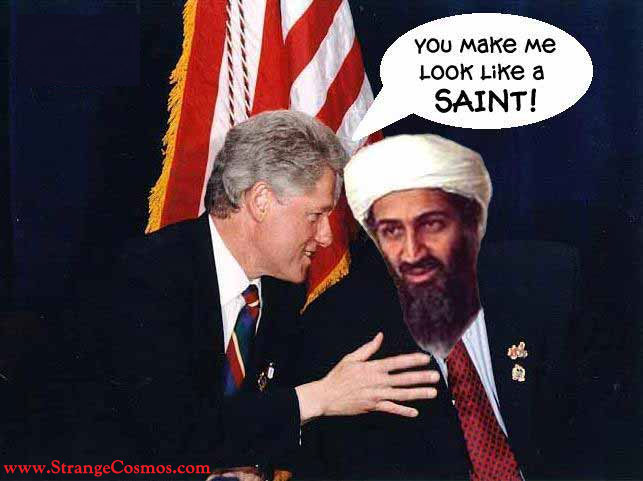
Under Clinton, we found that he supported Bin Laden and his network.
Bill Clinton's IRS pursued his personal enemies with great enthusiasm - auditing Billy Dale, Gennifer Flowers, Paula Jones, Juanita Broaddrick and dozens more - America's enemies, it seems, got a free pass from the same agency.
At least 16 U.S.-based non-profit entities have been linked financially to bin Laden.
The Islamic African Relief Agency (IARA), has been directly linked to earlier attacks on U.S. interests by bin Laden.
IARA reportedly transferred money to Mercy International, another non-profit Muslim organization that purchased vehicles used by Osama bin Laden to bomb the U.S. embassies in both Kenya and Tanzania on August 8, 1998.
The Clinton State Department showered the IARA with $4.2 million in grants.
The Clinton administration shut down a 1995 investigation of Islamic charities, concerned that a public probe would expose Saudi Arabia's suspected ties to a global money-laundering operation that raised millions for anti-Israel terrorists, federal officials told The Washington Times.
Bill Clinton's abuse of the military that included bombing Yugoslavia to distract from the scandals, China-gate and the rape of Juanita Broaddrick, strengthened Bin Ladens terrorist movement and its position in the Balkans and actually involved the U.S. allying itself with Bin Laden's KLA, which is a faction of Al Qaeda.
A story by Jerry Seper in the Washington Times on May 4, 1999, reported, "Some members of the Kosovo Liberation Army, which has financed its war effort through the sale of heroin, were trained in terrorist camps run by international fugitive Osama bin Ladenwho is wanted in the 1998 bombing of two U.S. embassies in Africa that killed 224 persons, including 12 Americans."
Seper said that newly obtained intelligence reports showed that the KLA had enlisted Islamic terrorists in its conflict with Serbia and that bin Laden's organization, known as al-Qaeda, had both trained and financially supported the KLA, which had been labeled a terrorist group by a Clinton State Department official.
President Clinton incubated the Taliban regime in Afghanistan for at least three years, despite the fact that it was harboring Osama bin Laden, was responsible for growing 60 percent of the world's heroin and denied basic human rights to the nation.
Rep. Dana Rohrabacher, R-Calif., says he was belittled, stonewalled and ridiculed for three years for asserting the congressional oversight role in the formulation of foreign policy toward Afghanistan during the last term of the Clinton administration.
Using his seat on the House International Affairs Committee, Rohrabacher attempted, he says, for several years to secure communiqués, cables and other State Department documents that would reveal what was behind U.S. policy toward Kabul. He says he and his committee were "stonewalled" and "belittled" in all their attempts.
According to Rohrabacher, the Clinton administration played a role in creating the Taliban by giving a 'green light' to Pakistan, Saudi Arabia, and other gulf states to fund, direct, and organize the Taliban.
Rohrabacher said at one point on the house floor in a Sept. 17th [1999] speech that the Clinton administration promised Pakistan and Saudi Arabia that it wouldnt overthrow the Taliban according to the UPI.
Robin Raphel, Clinton's assistant secretary of state for south Asia affairs until mid-1997, is believed to be instrumental in the rise of the Taliban.
One report suggested that several Islamic states expressed the belief that Raphel and other U.S. officials along with Afghans in the U.S. were on the payroll of Unocal's payroll. They cite that she provided a fiery defense of Unocal and especially the Taliban in negotiations with the Afghanistan government.
During such an encounter, Raphel's words -- in effect asking the government to 'give it up."
Read more about Clinton being Pro-Taliban here.
A secret deal between the Clinton administration and terrorists linked with Osama bin Laden led directly to the senseless slaughter of some 70 West European tourists and the wounding of hundreds, according to a book written by a former congressional terrorism expert.
According to Yossef Bodansky, author of "Bin Laden: The Man Who Declared War on America," a Central Intelligence Agency operative dealing with Islamic terrorists on matters of security for the U.S. forces in Bosnia-Herzegovina led them to believe President Clinton would look the other way at attempts to overthrow Egypt's Hosni Mubarak.
"If senior Islamicist terrorist leaders are to be believed, the Clinton administration was willing to tolerate the overthrow of the Mubarak government in Egypt and the establishment of an Islamist state in its stead as an acceptable price for reducing the terrorist threat to U.S. forces in Bosnia-Herzegovina," states the 1999 book, which has been rushed into a new printing.
The tradeoff was reportedly raised in discussions between Egyptian terrorist leader Ayman al-Zawahiri Osama bin Laden's right-hand man and an Arab-American, Abu-Umar al-Amriki, known as a CIA emissary.
In that attack, terrorists wielding machine guns and knives massacred nearly 70 tourists, most of them Swiss. For about 45 minutes, the attackers mowed down unarmed, unsuspecting tourists in an attempt to show the world that visitors were not safe in Mubarak's Egypt.
In addition to leading to the attack on the tourists, Bodansky writes, the secret deal between the Clinton administration and the bin Laden terrorist cell drove Mubarak into de facto cooperation with the Islamist terror-sponsoring states against the United States. Shortly afterwards, early in 1998, Egypt withheld support for the use of force by the U.S. against Iraq.
The Clinton-Reno Justice Department refused to allow two veteran FBI agents assigned to the anti-terrorist probe to investigate a key figure tied to Osama bin Laden.
According to ABC News correspondent Brian Ross today, the two agents told him they were ordered to stop investigations into a suspected terror cell linked to Osama bin Laden's al-Qaeda network and the Sept. 11 attacks.
FBI special agents Robert Wright and John Vincent told Ross they were called off criminal investigations of suspected terrorists linked to the deadly bombings of two U.S. embassies in Africa. U.S. officials say al-Qaeda was responsible for the embassy attacks and the Sept. 11, 2001, attacks in the United States.
"September the 11th is a direct result of the incompetence of the FBI's International Terrorism Unit. No doubt about that. Absolutely no doubt about that," Wright said. "You can't know the things I know and not go public."
Noting that, with growing terrorism in the Middle East in the mid-1990s, Wright and Vincent, then based in Chicago, were assigned to track a connection to a suspected terrorist cell that would later lead them to a link with Osama bin Laden. Wright told Ross that when he pressed for authorization to open a criminal investigation into the money trail, his supervisor stopped him.
Represented by Judicial Watch and former lead House impeachment counsel David Schippers, agents Wright and Vincent have filed suit against the Justice Department over the episode.
Under Clinton, Warnings about terrorist attacks were ignored.
CIA Director George Tenet refused on Wednesday to permit the House-Senate Select Committee probe into the 9/11 attacks to release information about intelligence briefings to the White House on terrorist activities, including whether the president was briefed on plots to use hijacked airliners as weapons.
Tenet's directive would cover whatever President Clinton was told about a 1998 plan to load an airliner with explosives and crash it into the World Trade Center.
"The director of central intelligence has declined to declassify two issues of particular importance to this inquiry," Eleanor Hill, staff director for the committee, told the panel.
"References to the intelligence community providing information to the president or White House" would remain classified, Hill testified during Wednesday's open hearing.
"According to [Tenet], the president's knowledge of intelligence information relevant to this inquiry remains classified even when the substance of intelligence information has been declassified," she explained.
The identity of and information on a key al-Qaeda leader involved in the Sept. 11 attacks would also stay classified, the committee director said.
The classified information would include news of whether then-President Clinton was tipped off about the 1998 plot involving what Hill said was a "group of unidentified Arabs [who] planned to fly an explosive-laden plane from a foreign country into the World Trade Center."
The hijacking tip was given to the Federal Aviation Administration and FBI. Neither agency acted on it. The mysterious Arab group may now be linked to bin Laden, Hill said.
The 1998 terrorist plot to use airliners as flying bombs was one of 12 similar plans outlined by Hill that were uncovered by investigators from 1994 through 2001.
Sources:
- The Heritage Foundation, "AFTER WORLD TRADE CENTER BOMBING, U.S. NEEDS STRONGER ANTI-TERRORISM POLICY," available here.
- The Jewish World Review, "Clinton's priority: Political correctness over fighting terror," available here.
- The Jewish World Review, "Clinton's failure to mobilize America to confront foreign terror after the 1993 attack led directly to 9-11 disaster," available here.
- Newsmax, "Clinton Paid 'Lip Service' to Terror Attacks, Expert Charges," available here.
- Human Events, "Gore's 'Ill-Considered' Somalia Story," available here.
- Townhall.com, "Clinton's legacy," available here.
-
Accuracy In Media, "Catastrophic Intelligence Failure," available here.
-
Newsmax, "Morris: Clinton Was Oblivious to Khobar Towers Terror Alert," available here.
-
Judicial Watch, "Why Was Clinton Soft on Terrorism?," available here.
-
MSNBC, "US State Dept. blocked FBI-Sudan cooperation on embassy bombings," available here.
-
Insight Magazine, "Clinton Connection Causes Quandary," available here.
-
The Associated Press, "Analyst: terrorism warning ignored," available here.
-
The Washington Post, "Intelligence Failure? Let's Go Back to Sudan," available here.
-
Accuracy In Media, "CLINTON'S "BIGGEST MISTAKE,"' available here.
-
The Associated Press, "Clinton rejected military strike on bin Laden" available here.
-
The National Review, "Another Clinton Tale? Did he really come close to taking out Osama Bin Laden?," available here.
-
The Washington Times, "Clinton White House axed terror-fund probe," available here.
-
World Net Daily, "Was Clinton pro-Taliban? Congressman charges Afghan extremists were coddled, oversight efforts 'belittled,'" available here.
-
World Net Daily, "Did Clinton nod to Mubarak overthrow? Book suggests foreign policy goof led to Luxor terror massacre," available here.
-
Newsmax, "CIA Sources: Clinton Administration 'didn't want' Bin Laden Arrested," available here.
-
World Net Daily, "Pentagon suspects Osama bin Laden - Officials anxious to take terrorist out, after Clinton let him 'grow in strength,'" available here.
-
L.A. Times, "Clinton Let Bin Laden Slip Away and Metastasize," available here.
-
Newsmax, "Clinton Paid 'Lip Service' to Terror Attacks, Expert Charges," available here.
-
U.K. Guardian, "Milosevic: Bin Laden was in Albania," available here.
-
Newsmax, "Agents: Clinton-Reno DOJ Nixed FBI Terrorist Probe," available here.
-
Newsmax, "Clinton Briefing on '98 WTC Hijack Plot to Stay Secret," available here.
|

